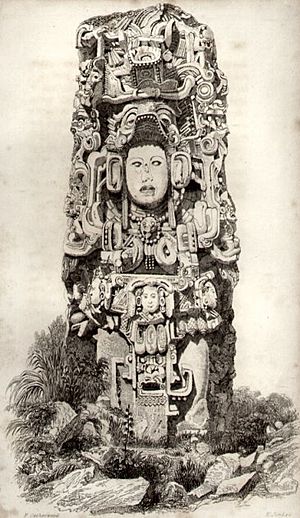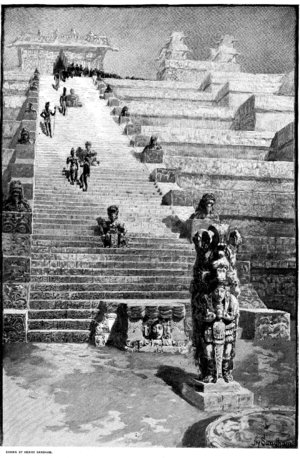Kʼakʼ Yipyaj Chan Kʼawiil facts for kids
Quick facts for kids Kʼakʼ Yipyaj Chan Kʼawiil |
|
|---|---|
| Ajaw | |

Kʼakʼ Yipyaj Chan Kʼawiil's portrait on Stela N
|
|
| King of Copán | |
| Reign | 18 February 749 - January 763 |
| Predecessor | Kʼakʼ Joplaj Chan Kʼawiil |
| Successor | Yax Pasaj Chan Yopaat |
| Born | Copán |
| Died | January 763 Copán |
| Spouse | A noblewoman/princess of Palenque |
| Issue | Yax Pasaj Chan Yopaat |
| Father | Kʼakʼ Joplaj Chan Kʼawiil |
| Religion | Maya religion |
Kʼakʼ Yipyaj Chan Kʼawiil was an important king of the ancient Maya city of Copán. He ruled from 749 AD until his death in 763 AD. He was the son of another king, Kʼakʼ Joplaj Chan Kʼawiil. When Kʼakʼ Yipyaj Chan Kʼawiil became king, Copán was going through a tough time. But he worked hard to bring the city back to its former glory. He built amazing new structures, like a bigger version of Temple 26, and made the famous Hieroglyphic Stairway even longer.
Contents
Kʼakʼ Yipyaj Chan Kʼawiil: A Mayan King
Kʼakʼ Yipyaj Chan Kʼawiil became the ruler of Copán, a powerful Maya city. His father was also a king named Kʼakʼ Joplaj Chan Kʼawiil. When Kʼakʼ Yipyaj Chan Kʼawiil started his rule, Copán was not doing very well. It was a quiet period for the city.
Rebuilding Copán
King Kʼakʼ Yipyaj Chan Kʼawiil wanted to make Copán strong again. He started many new building projects. One of his biggest projects was rebuilding Temple 26. He made it much grander than before. He also made sure the famous Hieroglyphic Stairway was put back on the new temple. He even made it twice as long!
Five large statues of past rulers were placed on the stairway. These statues showed important kings sitting down. Kʼakʼ Yipyaj Chan Kʼawiil died around 763 AD. It is believed he was buried in Temple 11, but his tomb has not been found yet.
The Amazing Hieroglyphic Stairway
The Hieroglyphic Stairway is a very special part of Structure 10L-26 in Copán. It is about 10 meters (33 feet) wide and has 62 steps. At the bottom of the stairway, there is a stone monument called Stela M and its altar.
What the Stairway Shows
Every 12th step of the stairway has a large sculpted figure in the middle. These figures are thought to represent the most important kings from Copán's history. The stairway gets its name from the more than 2200 glyphs carved into its steps. These glyphs form the longest known Maya hieroglyphic text.
History of the Stairway
The text on the stairway is still being put back together by experts. This is because the stone blocks fell when the temple's front collapsed. The staircase is 21 meters (69 feet) long. It was first built by King Uaxaclajuun Ubʼaah Kʼawiil in 710 AD. Kʼakʼ Yipyaj Chan Kʼawiil later reinstalled and expanded it in 755 AD, making it even more impressive.


